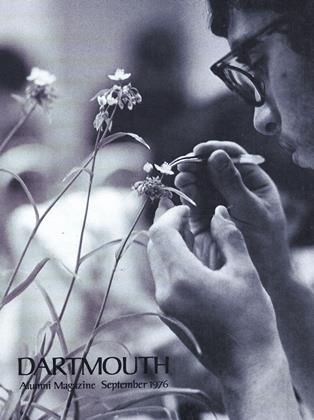"A deeply felt love of America ... had been developing slowly and silently over the long stretch of time since the establishing of the first English settlement at Jamestown. In every way the spirit of '76 was the culmination of the 169 year? that compose nearly all the first half of our history." Thus writes Carl Bridenbaugh in his superb book on the origins and growth of nationalism — Americanism — in this nation. Beautifully written, succinct and cogent, TheSpirit of '76 is one of those rare volumes that will be read and discussed long after we've survived all the Bicentennial celebrations, the independence oratory, and the cascade of books designed to capture the spirit (and profits) of our 200th birthday.
The Spirit of'76 touches on several aspects of American history that have gotten short notice from most historians who have dealt with our struggle for independence. Relying primarily on what the 17th- and 18th-century colonists wrote, privately and publicly, about the country they lived in, Bridenbaugh suggests that our war against England was inevitable after almost two centuries of that remarkable sense of place Americans had about a land that offered them their religious liberties and self government. For generations the colonists prospered here; and when English neglect turned in the 1760s into open hostility toward Americans, a century and a half of pride, affection, and love of place turned to warfare against the mother country. A nation of people solidified by a common language, a reverence for the land they owned, an ability to travel freely and to savour the country's material and spiritual comforts proved a harsh foe to the British. Moreover, Bridenbaugh reveals, Americans in the years before the Revolution felt an almost mystic kinship to one another - that sense of having participated in a Utopian errand into the wilderness and having succeeded so admirably.
Bridenbaugh attributes to no one single factor the solidification of America, a coming together of diverse people ready to assume the burdens of independence. But the seeds of individuality (that one facet of the American character that has affected such great changes in the world) were sown with the first settlements at Jamestown and Plymouth. In coming to grips with "the howling wilderness" of New England, the early Puritans quickly developed a pride in their individual accomplishments and a reverence for what we call today "Yankee cohesiveness." Almost everyone who took part in that noble experiment — from the lowliest yeoman to the most affluent and educated merchant — sensed something profound in the natural world that was America in the early years of its settlement.
Another factor which Bridenbaugh credits for bringing together a people into the common cause of nationhood was the Great Awakening, that outburst of religious enthusiasm that began in the 1740s and reverberated through the colonies for years afterwards. The Great Awakening was more than a religious movement, Bridenbaugh points out, for it almost immediately transcended the theological to promote "the Americanizing of religion in all the colonies." And thus Americanized, the people found yet another raison d'être.
Although Robert Frost's "The Gift Outright" isn't mentioned in this brilliant book, the poem does touch on Bridenbaugh's major thesis: "the land was ours before we were the land's." That sense of place — coupled with a sentiment exemplified by 18th-century politician John Dickinson's comment, "nations, in general are not apt to think until they feel" - informs Bridenbaugh's book.
THE SPIRIT OF '76By Carl Bridenbaugh '25Oxford, 1975. 162 pp. $8.95
Professor of English at the University ofConnecticut and recent visiting professor atDartmouth, Mr. Medlicott specializes inAmerican literature.
 View Full Issue
View Full Issue
More From This Issue
-
 Feature
FeatureSeeing Farther than the Green
September 1976 By BLISS K. THORNE and NANCY DECATO -
 Feature
FeatureSteady State
September 1976 By Pierre Kirch -
 Feature
FeatureHarvard Myths About Dartmouth
September 1976 By ERICH SEGAL -
 Feature
FeatureHANOVER SUMMER
September 1976 -
 Books
BooksNotes on a common bond: the federal city, that summer in Philadelphia, Essex County in revolt, and disaster in Ohio
September 1976 By R.H.R. -
 Article
ArticleMeasured Quantities
September 1976
Alexander G. Medlicott Jr. '50
Books
-
 Books
BooksTHE ANCESTRY OF THE LONGLIVED.
November 1934 By C.H. Forsyth -
 Books
BooksBriefly Noted
JUNE 1969 By J. H. -
 Books
BooksALBERT INSKIP DICKERSON: SELECTED WRITINGS
November 1974 By JAMES L. FARLEY '42 -
 Books
BooksTHE IGNORANCE OF CERTAINTY.
MARCH 1971 By JOHN HURD '21 -
 Books
BooksDEMOTIC GREEK: INSTRUCTION BY THE ORALIA URAL METHOD.
JANUARY 1973 By PAUL W. WALLACE -
 Books
BooksARKANSAS ADIOS.
JANUARY 1972 By SAMUEL F. PICKERING JR.



